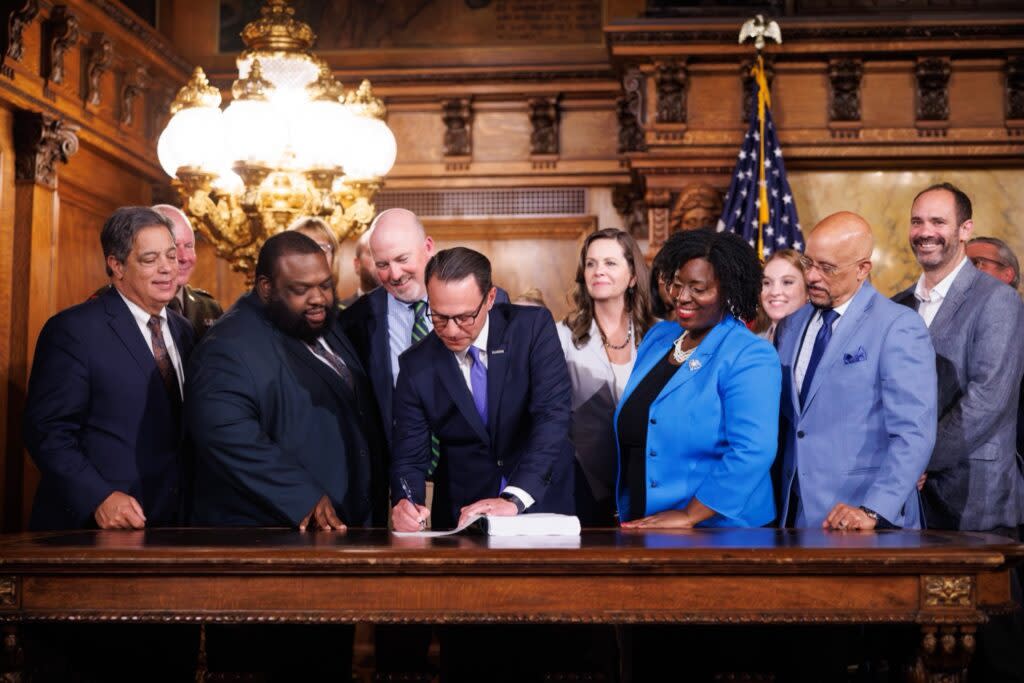Digging deep: Which new programs in the Pa. budget didn’t make headlines?

- Oops!Something went wrong.Please try again later.
Governor Josh Shapiro signed into law a bipartisan budget for fiscal year 2024-25 as Democratic legislative leaders watch Thursday, July 11, 2024. (Commonwealth Media Services photo)
Dollar signs followed by nine figures or more tend to make headlines when the state budget is signed, but dozens of smaller programs state lawmakers have worked for months or years to pass are nestled into the legislation that tells the state government how to spend the money.
The Fiscal Code, a voluminous document that is passed along with the budget, includes language that directs various parts of the government to make money available to pay for new programs that the state Legislature has passed in the months and weeks preceding the budget deadline.
The 2024-25 Fiscal Code bill includes money for solar power at public schools, Alzheimer’s and neurological disease research, and redeveloping blighted shopping malls, among other legislative goals. Here’s a look at a few of the programs lawmakers and Gov. Josh Shapiro have highlighted.
Solar for Schools
State Rep. Liz Fiedler (D-Philadelphia) introduced legislation last year that would allow Pennsylvania school districts to access federal Inflation Reduction Act funds to install solar arrays that would help them shrink their carbon footprint and save money on utilities.
Fiedler, who is chairperson of the House Democratic Blue-Green Caucus, and the bill’s co-sponsors pointed to success stories in school districts such as Steelton-Highspire just outside the state capital, where a solar installation built on a reclaimed landfill provides 100% of the district’s electricity.
More than a year after the state House passed the Solar for Schools bill with strong bipartisan support, the state Senate sent it to Shapiro’s desk with a 42-7 vote. The Fiscal Code provides $25 million through the Commonwealth Financing Authority to provide grants that would allow school districts to access federal funding for 30% to 50% of the cost of solar projects.
The state money is related to an additional $75 million in the Fiscal Code for school improvement grants that builds on $100 million in the last budget.
“That made a lot of sense because we’re talking about schools that desperately need electrical upgrades too,” Fiedler said, adding that solar energy can now be included in such improvement projects.
Support for dementia
The Fiscal Code directs the Pennsylvania Department of Aging to create the state’s first office dedicated to supporting dementia initiatives. In his remarks before signing the budget on Thursday night, Shapiro noted that it would serve 200,000 Pennsylvania residents diagnosed with Alzheimer’s disease.
“For years, people living with Alzheimer’s disease and related disorders have not been prioritized in Pennsylvania. We can and we must do better for them and their loved ones who care for them,” said Rep. Maureen Madden (D-Monroe), chairperson of the House Aging and Older Adult Services Committee. The state currently allocates only $250,000 for Alzheimer’s outreach.
Madden introduced House Bill 2400 to establish the office. The bill passed the House last month but was not considered in the Senate. Money to establish the office would come from the state lottery fund. The fiscal code also directs a portion of Tobacco Settlement funds to be used for Alzheimer’s research. In neither case are the amounts specified.
Agricultural innovation
Among Shapiro’s major budget initiatives when he unveiled his proposal for the next budget in March was a 10-year strategic economic development plan. In addition to hundreds of millions of dollars the plan provides for industrial site development, it creates an agricultural innovation grant program.
The grants, administered by the Department of Agriculture, would aid farmers in “taking vacant land and turning piles of abandoned dirt into real jobs,” Shapiro said.
The $10 million program would support innovations in energy efficiency, water quality, reduced water consumption and odors to attract new agricultural businesses to Pennsylvania, a description of the program by House Democrats said.
Individuals and companies would be eligible to receive grants ranging from $2,000 to $2 million depending on the scope of the proposal, according to the Fiscal Code.
Blighted malls
Rep. Joshua Siegel (D-Lehigh) said his legislation passed by the House in April would provide “once-in-a-lifetime redevelopment opportunities for communities” saddled with vacant or dying shopping malls.
House Bill 1799 was not considered in the Senate, but the Fiscal Code provides $10 million through the Commonwealth Financing Authority to assist in the redevelopment of malls and similar commercial properties.
The funding would provide grants and loans for developers to repurpose former malls as mixed use commercial and residential projects.
Public safety
While the budget provides $1.2 billion for the Pennsylvania State Police, it also includes funding to tackle violent crime in more community focused ways.
The Fiscal Code directs the Pennsylvania Commission on Crime and Delinquency to provide $11.5 million for grants to schools and community-based nonprofits to operate programs for at-risk youth before and after school and during summer vacations.
It also directs the PCCD to provide nearly $13 million distributed between the state attorney general’s office and the district attorney’s offices in Philadelphia and Pittsburgh joint local and state firearms task forces.
Pennsylvania tourism
Shapiro kicked off summer with a road trip promoting Pennsylvania as the “Great American Getaway.” The Fiscal Code directs the state Department of Community and Economic Development to spend $19.3 million to promote tourism in Pennsylvania.
The tourism office is to use the money in part to promote a series of cultural and arts activities that generate statewide and regional economic impact. The legislation also directs the office to use $1 million to conduct a statewide competition for around 2,000 athletes with intellectual disabilities.
The post Digging deep: Which new programs in the Pa. budget didn’t make headlines? appeared first on Pennsylvania Capital-Star.

